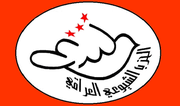Iraqi Communist Party الحزب الشيوعي العراقي | |
|---|---|
 | |
| Abbreviation | ICP (حشع) |
| Leader | Raid Fahmi[1][2][3] |
| Founded | 31 March 1934[4] |
| Headquarters | Al Nithal Street, Baghdad |
| Newspaper | Al-Qaidah[5] The Spark (الشرارة) Path of the People[6] (طريق الشعب)[7] |
| Youth wing | Iraqi Democratic Youth Federation |
| Paramilitary wing | Al-Ansar (Iraq) |
| Ideology | Communism[8][9] Classical Marxism[10] Reformism[11] Secularism[8] Nonsectarianism[12] |
| Political position | Left-wing |
| National affiliation | National Union Front (1954–1958)[13] National Progressive Front (1974–1979) People's Union (2005–2010)[14][6] Civil Democratic Alliance[15][16] (2013–2018) Alliance Towards Reforms (Saairun) (2018–2022) |
| International affiliation | IMCWP |
| Colors | Red and White |
| Slogan | "A free homeland and a happy people"[17] (وطن حر وشعب سعيد) |
| Council of Representatives | 0 / 329 |
| Party flag | |
 | |
| Website | |
| iraqicp.com | |
The Iraqi Communist Party (Arabic: الحزب الشيوعي العراقي al-ḥizb aš-šiyūʿī al-ʿirāqī; Kurdish: حیزبی شیووعیی عێراقی, romanized: ḥizbī šiyūʿītē ʿirāqī)[18][19] is a communist party and the oldest active party in Iraq. Since its foundation in 1934, it has dominated the left in Iraqi politics. It played a prominent role in shaping the political history of Iraq between its foundation and the 1970s. The Party was involved in many of the most important national uprisings and demonstrations of the 1940s and 1950s.[20] It suffered heavily under the Ba'ath Party and Saddam Hussein but remained an important element of the Iraqi opposition and was a vocal opponent of the United Nations sanctions imposed on Iraq after the Gulf War of 1991. It opposed the United States invasion of Iraq in 2003 but since then has participated in the new political institutions. It received little support in the Iraqi general elections of 2005. The party gained some seats in each province in which the 2013 Iraqi governorate elections were held.[21]
The party joined the newly established Sairoun Alliance in the 2018 parliamentary elections, who gained the highest number of votes and a total of 54 seats in the Iraqi parliament. A communist woman representing the alliance, Suhad al-Khateeb, was also elected in the elections to represent the city of Najaf, deemed to be one of the holiest religious and conservative cities in Iraq. Al-Khateeb, who is a teacher and an anti-poverty and women's rights activist, said upon her victory "the Communist party have a long history of honesty – we were not agents for foreign occupations. We want social justice, citizenship, and are against sectarianism, and this is also what Iraqis want."[22][23]
- ^ "سمير عادل - سقطات حميد مجيد موسى - سكرتير الحزب الشيوعي العراقي،". الحوار المتمدن.
- ^ "حوار مع رائد فهمي سكرتير الحزب الشيوعي العراقي: تحالف شيوعي إسلامي "عابر للطائفية" في العراق - Qantara.de". Qantara.de موقع قنطرة للحوار مع العالم الإسلامي ـ. 5 April 2018.
- ^ "Data". www.rudaw.net. Retrieved 19 May 2020.
- ^ "Red flag over Babylon: a brief overview of the Iraqi Communist Party". libcom.org.
- ^ Вадим Васильевич Кортунов (1983). Справочник пропагандиста-международника. Политиздат. p. 189.
- ^ a b Jabbar, Faleh Abdel (13 February 2013). Catusse, Myriam; Karam, Karam (eds.). The Iraqi Communist Party. Co-éditions. Presses de l’Ifpo. pp. 293–312. ISBN 9782351592618 – via OpenEdition Books.
- ^ "Communist Party". communist-party.org.uk.
- ^ a b "من نحن". www.iraqicp.com.
- ^ "Interview with the Iraqi Communist Party". 18 July 2003.
- ^ "عبدالحسين شعبان يفتح ملفات الشيوعيين وعراق الإسلام السياسي". MEO. 17 March 2018. Archived from the original on 25 June 2020. Retrieved 19 May 2020.
- ^ "برنامج تحالف "سائرون" رقم القائمة 156". www.iraqicp.com.
- ^ "Iraqi Communists and Shia Sadrists unite to tackle corruption and sectarianism". Middle East Eye.
- ^ Ghareeb, Edmund A.; Dougherty, Beth K. (2004). Historical Dictionary of Iraq. Lanham, Maryland and Oxford: Scarecrow Press. pp. 170–171.
- ^ "الحزب الشيوعي العراقي اتحاد الشعب يعلن خارطة طريق للخروج من الازمة السياسية العراقية". www.alwatanvoice.com.
- ^ Saleh, Ibrahim. "iraq's civil democratic alliance celebrates four new MPs". Niqash.
- ^ "مكونات التحالف المدني الديمقراطي-الأخبار - رابطة المرأة العراقية". iraqiwomensleague.com.
- ^ Franzén, Johan (2011). Red Star over Iraq: Iraqi Communism Before Saddam. Hurst. ISBN 9781849041010.
- ^ "كۆمیتەی خورماتووی حزب، 83 ساڵەی دامەزراندنی حزبی شیوعی عێراق و كوردستانیان پیرۆز كرد" (in Kurdish). Archived from the original on 25 December 2019. Retrieved 25 December 2019.
- ^ "Barzanî: Pêwîst e Hikûmeta nû ya Iraqê li ser bingeha Şeraket, Lihevkirin û Wekheviyê be" (in Kurdish). Retrieved 25 December 2019.
- ^ "Iraq - The Iraqi Communists and Baathist Iraq". countrystudies.us.
- ^ Ali Abel Sadah (24 April 2013). "Maliki Falls Short of Majority In Early Election Returns". Al-Monitor. Retrieved 28 April 2013.
- ^ "First female Communist elected in Iraq's holiest city calls for 'social justice'". Middle East Eye. Retrieved 19 May 2018.
- ^ Shafaaq. "First female Communist elected in Iraq's holiest city calls for 'social justice'". Shafaq. Archived from the original on 28 April 2019. Retrieved 19 May 2018.